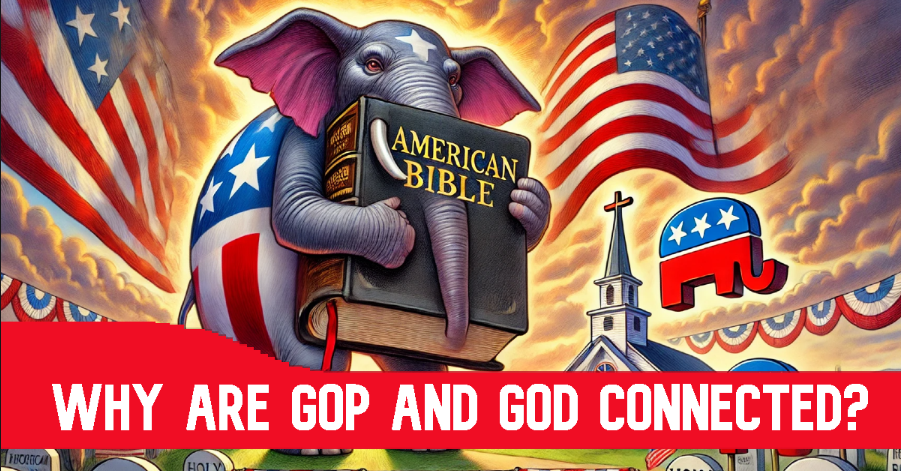The intertwining of the Republican Party (GOP) and Christian identity, particularly among white evangelical Protestants, has deep historical roots and significant political implications. While a substantial number of Democrats also identify as Christians, the GOP has increasingly positioned itself as the party aligned with Christian—especially evangelical—values.
The intricate relationship between the Republican Party (GOP) and its Christian base has evolved over decades, culminating in contemporary initiatives like Project 2025. This initiative, championed by Christian nationalists, aims to reshape America’s future by infusing governance with specific religious principles.
The GOP and Its Christian Base
The alliance between the GOP and Christian conservatives gained significant momentum in the late 20th century. In 1979, influential figures such as Jerry Falwell, alongside Paul Weyrich, founded the Moral Majority, a political organization that sought to mobilize conservative Christians as a political force. This movement aimed to influence public policy on issues like abortion, school prayer, and the perceived moral decline of society. The Moral Majority’s efforts were instrumental in rallying evangelical voters to support Republican candidates.
Ronald Reagan’s presidential campaigns further solidified this bond. In 1980, Reagan secured approximately 67% of the white evangelical vote, a figure that soared to 80% by his 1984 re-election. Reagan’s policies and rhetoric resonated with evangelical concerns, particularly his opposition to abortion and support for traditional family values. This period marked a significant shift, with the GOP increasingly aligning itself with Christian conservative ideals.
The Rise of Christian Nationalism and Project 2025
In recent years, the concept of Christian nationalism has gained prominence within certain GOP factions. Christian nationalists advocate for a governance model that intertwines Christian principles with national policies, asserting that America’s identity and laws should reflect specific religious values.
A notable manifestation of this ideology is Project 2025, an initiative spearheaded by the Heritage Foundation. This project serves as a comprehensive blueprint for a potential conservative administration, outlining strategies to restructure the U.S. government and implement policies rooted in conservative Christian values. The plan emphasizes the infusion of “biblical principles” into governance and advocates for expanding executive powers to achieve these objectives. Critics argue that such measures could undermine the separation of church and state, leading to a governance model that prioritizes specific religious doctrines over pluralistic democratic ideals.
Controversies and Implications
The growing influence of Christian nationalism within the GOP has sparked intense debates. Proponents view initiatives like Project 2025 as necessary to counteract what they perceive as a moral and cultural decline, aiming to restore America’s foundational values. Conversely, detractors warn that merging religious doctrines with state policies threatens religious freedom and could marginalize non-Christian communities.
The recent Alliance for Responsible Citizenship (Arc) conference in London exemplifies this global discourse. Dubbed a “rightwing Davos,” the event attracted conservative leaders and activists who discussed themes centered around traditional Christian family values and perceived threats to Western civilization. The conference highlighted the increasing convergence of U.S. and European right-wing sentiments, with a notable presence of U.S. advocacy groups aiming to expand their influence beyond American borders. This underscores the transnational nature of the Christian nationalist movement and its potential implications for global politics.
The historical alliance between the GOP and its Christian base has evolved into a complex and controversial relationship, with initiatives like Project 2025 exemplifying the aspirations of Christian nationalists to reshape America’s future. As this movement gains momentum, it raises critical questions about the balance between religious influence and democratic governance, the preservation of religious freedoms, and the direction of the Republican Party in the coming years.
Key Resources on Project 2025 and the rise of Christian Nationalism:
- Project 2025 Overview: An in-depth look at the Heritage Foundation’s blueprint for integrating biblical principles into government operations.
- https://www.britannica.com/topic/Project-2025
- Analysis of Project 2025’s Implications: A critical examination of how Project 2025 could impact religious freedom and democracy.
https://www.interfaithalliance.org/post/how-project-2025-threatens-religious-freedom-amp-democracy-2f854 - Christian Nationalism’s Influence in Politics: An exploration of the rising trend of Christian nationalism and its effects on U.S. politics.
https://forward.com/news/697054/christians-against-christian-nationalism-project-2025
Organizations confronting Christian Nationalism:
- Christians Against Christian Nationalism: A coalition of Christians advocating for the separation of religious beliefs from governmental policies.
https://www.christiansagainstchristiannationalism.org/ - Americans United for Separation of Church and State: A nonpartisan organization dedicated to preserving the constitutional principle of church-state separation.
https://www.au.org/the-latest/church-and-state/articles/to-all-the-christians-fighting-christian-nationalism-thank-you - Interfaith Alliance: An organization promoting mutual respect among different faith traditions and advocating against the imposition of any single religious viewpoint in government.
https://interfaithalliance.org/post/how-project-2025-threatens-religious-freedom-amp-democracy-2f854
Sources
- “Christian right.” Wikipedia, https://en.wikipedia.org/wiki/Christian_right
- “Project 2025: The Blueprint for Christian Nationalist Regime Change.” Kettering Foundation, https://kettering.org/project-2025-the-blueprint-for-christian-nationalist-regime-change/
- “Project 2025.” Britannica, https://www.britannica.com/topic/Project-2025
- “US culture war show comes to London – and strikes a chord with European populists.” The Guardian, https://www.theguardian.com/politics/2025/feb/20/us-culture-war-show-arc-london-strikes-chord-european-populists
- “Part megachurch, part political rally: inside London’s ‘rightwing Davos’.” Financial Times, https://www.ft.com/content/7ff1614c-38a2-4b5c-81d3-80cea1196dad

